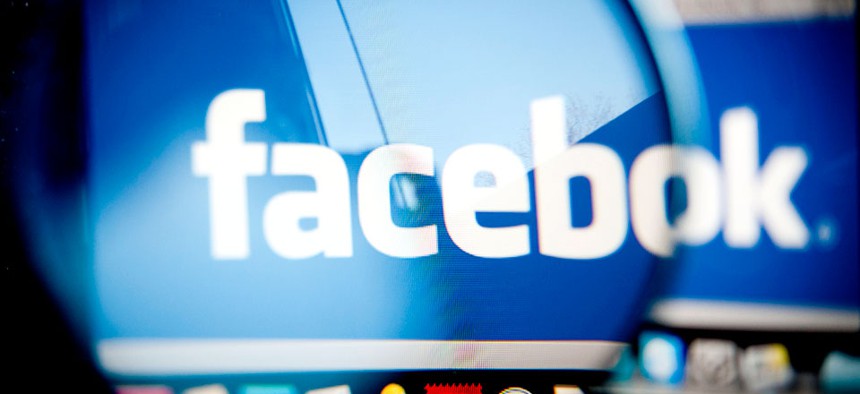VA Spent $2 Million on Facebook Ads

Timur Emek/AP
One division spent heavily on the ads while others spent little or nothing.
The Veterans Affairs Department has spent about $2 million on Facebook advertising to lure new followers and maintain ties with existing followers on the social media site, a government official who asked not to be named told Nextgov.
A substantial portion of VA’s Facebook ad spending has gone to the page for Make the Connection, a division of the Veterans Health Administration focused on reaching out to veterans suffering from post-traumatic stress disorder and related conditions and to their families, said Brandon Friedman, who was VA’s online communications director until August 2012.
The Make the Connection Facebook page has about 1.65 million “likes” compared with about 300,000 likes for VA’s main Facebook page and 78,000 likes for its main health administration Facebook page. The White House Facebook page, likely the most popular in government, has about 1.8 million likes.
Friedman said Make the Connection was an outlier among VA divisions, most of which have spent only a few thousand dollars on Facebook ads.
The vast majority of VA Facebook ad spending occurred after the agency learned of a change to Facebook’s algorithm that resulted in posts from organizations that didn’t buy ads appearing in fewer of their followers’ newsfeeds, he said.
A study reported by the magazine Ad Age in November 2012 found a nearly 40 percent drop in the number of “organic” posts -- meaning posts that weren’t backed by advertising money -- that Facebook users were seeing from organizations they “liked.” Facebook treats the pages of companies, federal agencies and other organizations differently from personal pages.
VA’s public affairs office had not provided Nextgov with any information about Make the Connection’s Facebook ad budget as of midday Friday. Nextgov first requested information about VA spending on Facebook ads on July 3 and requested information specifically about Make the Connection’s ad spending on Monday.
VA did confirm that it had spent only $1,000 on ads for its main Facebook page as an experiment to see whether it would significantly raise the number of people who liked the page.
Friedman requested permission for that original $1,000 ad buy but opted not to purchase additional ads, he said. That decision was partly because Friedman determined the ads did not produce a sufficient return on investment, he said, but also because he was upset about Facebook’s algorithm change “throttling” VA’s outreach.
“I felt like we had Facebook’s brand all over our stuff and we’d invested a lot of time and resources in building up our fan base and when we found out we weren’t reaching all of our fans, I figured we’d be better off spending our money in other ways,” he said.
Facebook is the most popular social media site among veterans, Friedman said, far outpacing Twitter, YouTube and other sites. As a result, he said, VA and private veterans organizations have tended to focus more of their outreach efforts on the site.
VA has also spent several million dollars on television ads to educate veterans of the wars in Iraq and Afghanistan about benefits they’re eligible for. The Army spends roughly $200 million on advertising annually, aimed mainly at recruitment. Other service branches also have significant ad budgets.
Government spending on Facebook advertising has been controversial in the past few weeks, driven by news that the State Department’s Bureau of International Programs spent $630,000 on Facebook ads in an effort to reach a broader foreign audience. Many State employees considered that spending a waste of money, according to a May inspector general’s report.
Though Friedman chose not to buy additional ads for the main VA Facebook page, he can see both sides of the argument, he said.
“Even if Facebook is being unfair because you built up your fan base yourself and they’re making you pay to reach those fans, you can argue ‘well, I’m here to reach veterans,'' he said. “The taxpayers want VA to reach veterans where they are. So you can say ‘it doesn’t matter what Facebook’s business model is, we’re just going to reach as many veterans as we have money to reach.’”
On the other hand, he said, “you can say ‘I feel like I’m being taken advantage of and we’re going to reach veterans in other ways.’ That was my personal position but not everyone in VA obviously felt that way.”
Friedman, who is now a vice president at the public relations firm Fleishman-Hillard, said he was expressing his personal views and not speaking for any organization.
The General Services Administration makes governmentwide recommendations on social media policy. In response to an inquiry about Facebook ad buying, a GSA Spokeswoman pointed Nextgov to the site HowTo.gov, which lists numerous best practices for social media but doesn’t address advertising.
“Social media tools present unparalleled opportunities for collaborative government,” the spokeswoman said in an emailed statement.
“Polls have shown that a large majority of Americans want to engage with their government through social media and find it very beneficial," she said. "Agencies are encouraged to efficiently test and use social media tools to drive engagement with citizens -- and to measure the success of this engagement with a diverse set of recommended federal social media metrics.”






